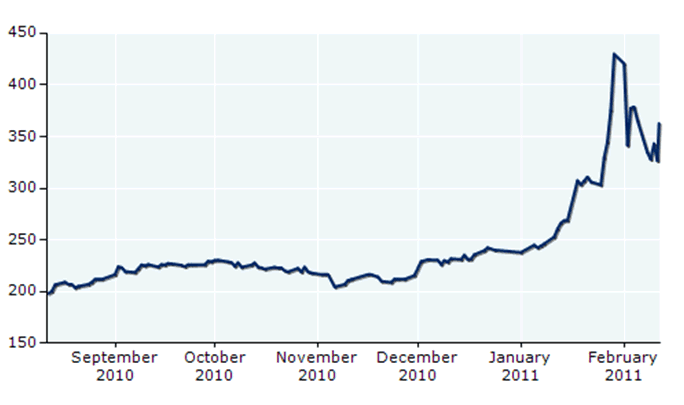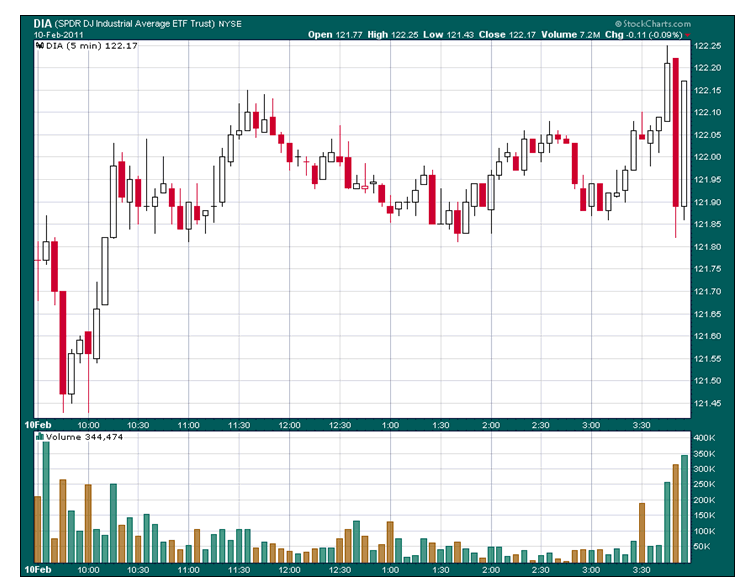A Regime Changer
Stock-Markets / Financial Markets 2011 Feb 12, 2011 - 03:24 AM GMTBy: Barry_M_Ferguson
 Yes, we all know what has been happening in Egypt over the past couple of weeks. Well, maybe most Americans don’t. The TV show ‘American Idol’ is back in season and some nitwit on some other reality show is thinking about changing her eye shadow or something. But for the rest of the world, we are witness to a profound change in the politics of Egypt and that change was brought about by determined and massive citizen dissent.
Yes, we all know what has been happening in Egypt over the past couple of weeks. Well, maybe most Americans don’t. The TV show ‘American Idol’ is back in season and some nitwit on some other reality show is thinking about changing her eye shadow or something. But for the rest of the world, we are witness to a profound change in the politics of Egypt and that change was brought about by determined and massive citizen dissent.
The people of Egypt were fed up with a lying, corrupt, oppressive governmental regime that had stolen the riches of the country only to deposit them in the hands of a minority elite while all the time promising reform and change. They were not only fed up the US, they were also fed up with their own regime. They were tired of their government regulating the citizens to death. They were tired of their government waterboarding the citizens with no regard for civility or law. So they did what they had to do. They revolted against the regime in charge.
Maybe it’s my Scots-Irish blood but I just love a good revolution. The yearning of freedom from oppressive governmental regulation should resonate within the soul of every human being. The people of Egypt deserve to be free and they shouldn’t have to be dominated by government of any kind. The genius of Thomas Jefferson and James Madison framed the US government as it should be - a servant of the people and not the other way around. But ever since the Constitution of the United States became law, the central bankers have been trying to erode and dilute the document’s containment of government power. It is only through government power and concentration of that power that a central bank can exercise its influence. That influence once rooted, grows unfettered until it is empowered through regulatory dominance. Occasionally, there is a populace uprising like we see in Egypt. May God be with the people seeking freedom!
Why do I bring central bankers into the picture? Because they are into everything and they seek power by any means necessary and by any action necessary. We mustn’t attach too much to any revolution in context to today’s environment. The crux of any political change does not lie in whether or not the populous is enslaved or oppressed. Political change does not lie in whether or not the populous is starving due to the inflationary tactics of central bankers. Political change doesn’t even lie in whether or not certain nations seek to militarily dominate their neighbors. No - we can, and do, live with all that. In fact, most of us turn a blind eye toward governmental abuse as long as our favorite stock index keeps rising. Central banks have been flooding the system with money and credit and ultra-low interest rates to sustain this stock ascent. Central banks and markets now work in concert. Of course, all of their activity is focused on dominance and centralized wealth. Centralized wealth allows for monopolized lending. The central banks control that lending. They, and their shill banks, insure that lending through derivatives and credit default swaps. Now, for a moment of truth.
The central bankers can tolerate revolution. They can even tolerate regime changes. But, when this activity begins to disturb the valuations of their credit default swaps, now we are talking about a call to action. Bankers now stand to lose money! Shown below is a chart of the credit default swap values for Egypt over the past six months. This is a graph of how much it costs to insure the credit default swaps tied to Egypt’s debt. As you can see, when the revolution erupted a few weeks ago, so to did the cost of the CDS’s. As the CDS cost threatened to rise further, something had to change. Either Mubarak had to resign or the bank would have to call in the military to do what the military does with all the weapons that the US provided. This is how I knew Mubarak would go. Military action would have escalated the CDS costs. Now Egypt will have to make a transformation in leadership. The CDS chart will be interesting to watch. Should Egypt decide to follow the US model and surrender to the banks, the CDS costs will likely fall immediately. Then, they will likely escalate like Ireland’s or Greece’s have as perpetual sovereign debt is established. Egypt will then be bound with the enslaving ropes of TARP or TALF or QE or POMO. They will have surrendered like the US did in 2007. Should they elect to follow Jefferson and Madison and Jackson and shun the central bank dominance, the CDS costs will rise in the interim and then fall to zero and perhaps even disappear. Then the central bank will have to make another decision. Look at Chart 1 and it is easy to see why Mubarak had to leave office.

Source: http://www.cmavision.com/market-data
Chart 1 courtesy StockCharts.com
Given the potential market reaction to Mubarak resigning as President of Egypt, one wonders if anyone could have anticipated such an action. One only has to look at the DIA ETF from February 10 - the day before Mubarak’s resignation. The following chart is a 5-minute bar intraday chart. We can see what I call the ‘POMO’ pattern at work. The indexes sagged at the beginning of trading only to be goosed in fairly heavy volume by a ‘force’ that didn’t want the index to fall further. From mid-morning, the index traded flat with light volume. Then, in true Federal Reserve fashion, the final fifteen minutes of the day exploded in trading volume and volatility. At 3:45, the DIA burst higher. At 3:50, a strong selling program hit that accounted for some 5% of the entire day’s trading volume over 5 minutes. However, at 3:55 (the NYSE closes at 4:00), someone was ready with more than 5% of the day’s trading volume in the final 5 minutes of the day to jack the DIA back up. Whew!! Did somebody know something was about to happen in Egypt? Or, was someone just determined to carry on with the stock index rally? Let’s just call that someone, ‘the central bank’. Look at Chart 2.

DIA 5-minute intraday chart 2/10/2011
Chart 2 courtesy StockCharts.com
Now, what should investors do? The problem of Egypt’s CDS’s was solved on a Friday with President Mubarak’s resignation. The Fed has the pedal to the floor on the stock rally. Unemployment in the US has dropped to only 9% and supposedly, the US is the only nation in the solar system that does not have any inflation. Well, of course not. What would one expect in a controlled, contrived, dominated, and oppressed society? What would we expect from our stock indices? Onward and upward my friends!! Oh, and a word for world leaders. You can do to your citizens whatever you please. Chain them, whip them, starve them, steal from them - we don’t care. But, if do something to mess with the credit default swap values - you gotta go!!
Barry M. Ferguson, RFC
President, BMF Investments, Inc.
Primary Tel: 704.563.2960
Other Tel: 866.264.4980
Industry: Investment Advisory
barry@bmfinvest.com
www.bmfinvest.com
www.bmfinvest.blogspot.com
Barry M. Ferguson, RFC is President and founder of BMF Investments, Inc. - a fee-based Investment Advisor in Charlotte, NC. He manages several different portfolios that are designed to be market driven and actively managed. Barry shares his unique perspective through his irreverent and very popular newsletter, Barry’s Bulls, authored the book, Navigating the Mind Fields of Investing Money, lectures on investing, and contributes investment articles to various professional publications. He is a member of the International Association of Registered Financial Consultants, the International Speakers Network, and was presented with the prestigious Cato Award for Distinguished Journalism in the Field of Financial Services in 2009.
© 2011 Copyright © 2010 Copyright BMF Investments, Inc. - All Rights Reserved
Disclaimer: The views discussed in this article are solely the opinion of the writer and have been presented for educational purposes. They are not meant to serve as individual investment advice and should not be taken as such. This is not a solicitation to buy or sell anything. Readers should consult their registered financial representative to determine the suitability of any investment strategies undertaken or implemented.
© 2005-2022 http://www.MarketOracle.co.uk - The Market Oracle is a FREE Daily Financial Markets Analysis & Forecasting online publication.



